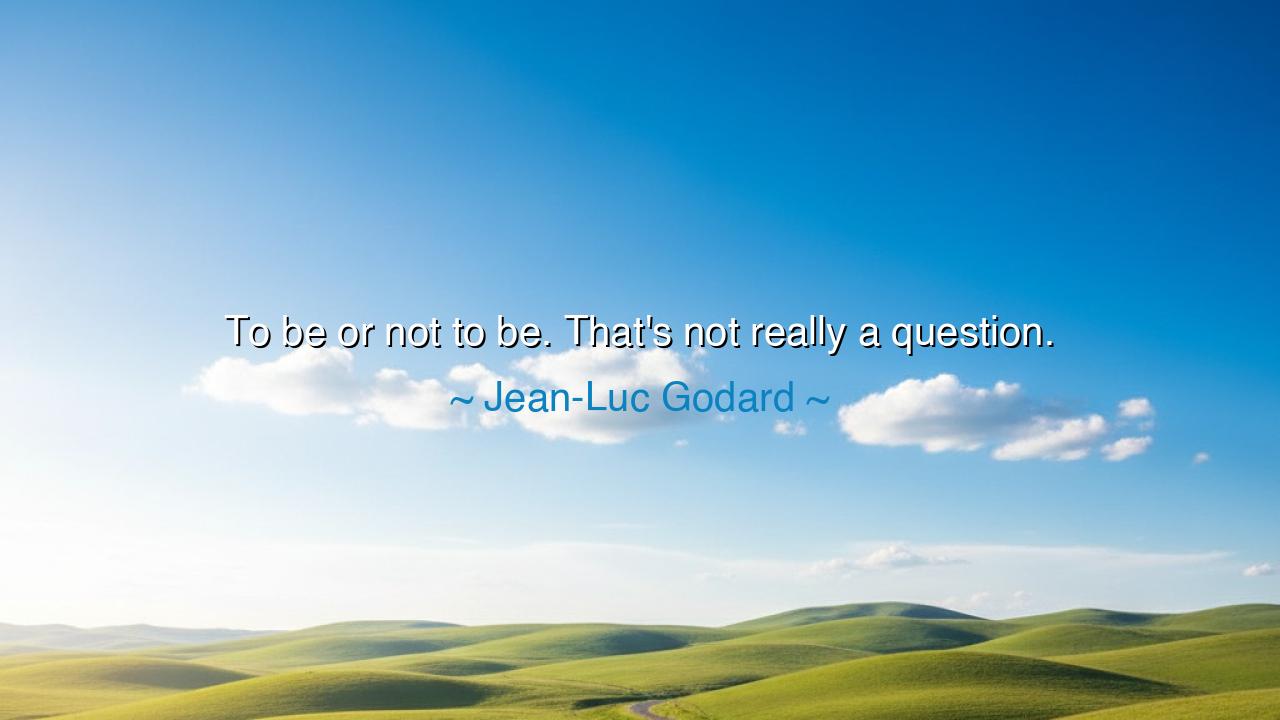
To be or not to be. That's not really a question.






"To be or not to be," the timeless phrase from Shakespeare's Hamlet, has echoed through the ages as a symbol of life's deepest existential dilemma. Yet, Jean-Luc Godard, the visionary filmmaker, offers a bold reinterpretation, claiming that "That's not really a question." In his concise dismissal of this centuries-old inquiry, Godard challenges us to look deeper into the nature of existence and the role of choice. Being, he suggests, is not a question to be pondered endlessly in silence or despair, but rather a reality that calls for action and engagement. Life, he proposes, is not about contemplation alone, but about the act of living itself—bold, unruly, and filled with purpose.
For centuries, thinkers have agonized over existence. They have debated whether we truly have a say in our fate, whether we must seek meaning, or whether life is simply an absurd dance of randomness. Shakespeare’s Hamlet, in his famous soliloquy, wrestled with the burden of choice, caught between the nobility of enduring life's suffering and the release of death’s unknown embrace. Yet Godard’s words bring forth a critical realization: existence is not an eternal question that can be solved in the quiet moments of introspection. It is a force that propels us forward, whether we choose to act or not. His dismissal of Hamlet's question is, in a way, a call to stop waiting for permission or waiting for answers and instead step boldly into the tumult of life.
Consider, then, the story of Alexander the Great, whose destiny was not written in the stars but forged through action. Born to a royal lineage, he could have easily spent his life pondering his place in the world, as Hamlet did, but instead, he chose to carve his name into history through bold conquest. Alexander never lingered in indecision; the question of whether to be or not to be was irrelevant to him, for the question was always how to act, how to shape the future, how to define his own existence. The lesson here is clear: action itself is the answer to the question that so many of us ask about our purpose. Life does not wait for our answers—it demands that we rise to the challenge and engage with it fully.
In our modern age, we too are often caught in the web of indecision. The weight of existential questions can paralyze us: What should we do with our lives? Should we settle for comfort, or take risks for something greater? Godard’s words offer a liberation from this paralysis. He tells us that the question of being is not a matter for endless intellectualization. The act of existence is the answer in itself. We do not need to wait for the perfect moment, the perfect answer, or the perfect understanding. We simply need to live—to step into the world with courage and with purpose, to embrace the unknown with the fierce resolve to make our mark.
Let us take, for example, Marie Curie, whose scientific explorations pushed the boundaries of human knowledge. She did not question whether she should enter the world of science, nor did she hesitate before facing the perils of working with radioactive materials. The question of whether to be a scientist or not was never on her mind—she simply was. In this resolute commitment to her calling, she carved a path that would forever alter the course of science and humanity. Her life embodies Godard's philosophy: the question is not whether we should live or not, but whether we have the courage to act upon our passions, to see beyond the question, and to create something meaningful in the world.
The call, then, is clear: to exist is not a question—it is a truth that requires no justification. The true question, as Godard suggests, is not whether to live but how to live, how to define our path, how to transform our being into action. Our lives must not be defined by the questions we ask, but by the choices we make. The power to shape our destiny lies not in the search for answers but in the brave act of forging ahead, despite the uncertainties that lie before us.
Therefore, let us rise, not in search of answers, but in search of purpose. The true wisdom lies not in pondering the abstract question of existence, but in embracing life with all its imperfections and challenges. Our actions, our decisions, and the way we interact with the world—these are the true answers to the question that has so long haunted humanity. To be, as Godard reveals, is not a question; it is a privilege, a call to engage fully with the gift of life.






AAdministratorAdministrator
Welcome, honored guests. Please leave a comment, we will respond soon